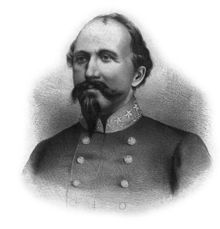General John Hunt Morgan
| John Hunt Morgan | |
|---|---|

John Hunt Morgan
Engraving by George Edward Perine (1837–85) |
|
| Nickname(s) | Thunderbolt |
| Born |
June 1, 1825 Huntsville, Alabama |
| Died | September 4, 1864 (aged 39) Greeneville, Tennessee |
| Place of burial | Lexington Cemetery |
| Allegiance |
United States of America Confederate States of America |
| Service/branch |
United States Army Confederate States Army |
| Years of service | 1846–1847 (USA) 1857–1861 (Kentucky militia) 1861–1864 (CSA) |
| Rank |
|
| Battles/wars | |
| Signature | |
John Hunt Morgan (June 1, 1825 – September 4, 1864) was a Confederate general in the American Civil War.
In April 1862, he raised the 2nd Kentucky Cavalry Regiment, fought at Shiloh, and then launched a costly raid in Kentucky, which encouraged Braxton Bragg's invasion of that state. He also attacked the supply-lines of General William S. Rosecrans. In July 1863, he set out on a 1000-mile raid into Indiana and Ohio, taking hundreds of prisoners. But after most of his men had been intercepted by Union gunboats, Morgan surrendered at Salineville, Ohio, the northernmost point ever reached by uniformed Confederates. The legendary "Morgan's Raid", which had been carried out against orders, gained no tactical advantage for the Confederacy, while the loss of his regiment proved a serious setback.
Morgan escaped from his Union prison but his credibility was low, and he was restricted to minor operations. He was killed at Greeneville, Tennessee in September 1864. Morgan was the brother-in-law of Confederate general A.P. Hill.
John Hunt Morgan was born in Huntsville, Alabama, the eldest of ten children of Calvin and Henrietta (Hunt) Morgan. He was an uncle of geneticist Thomas Hunt Morgan and a maternal grandson of John Wesley Hunt, an early founder of Lexington, Kentucky, and one of the first millionaires west of the Allegheny Mountains. He was also the brother-in-law of A.P. Hill and of Basil W. Duke. He was said to be a direct descendant of Revolutionary War general and hero Daniel Morgan., whose own great grand-uncle was perhaps history's most successful privateer, Henry Morgan.
...
Wikipedia
